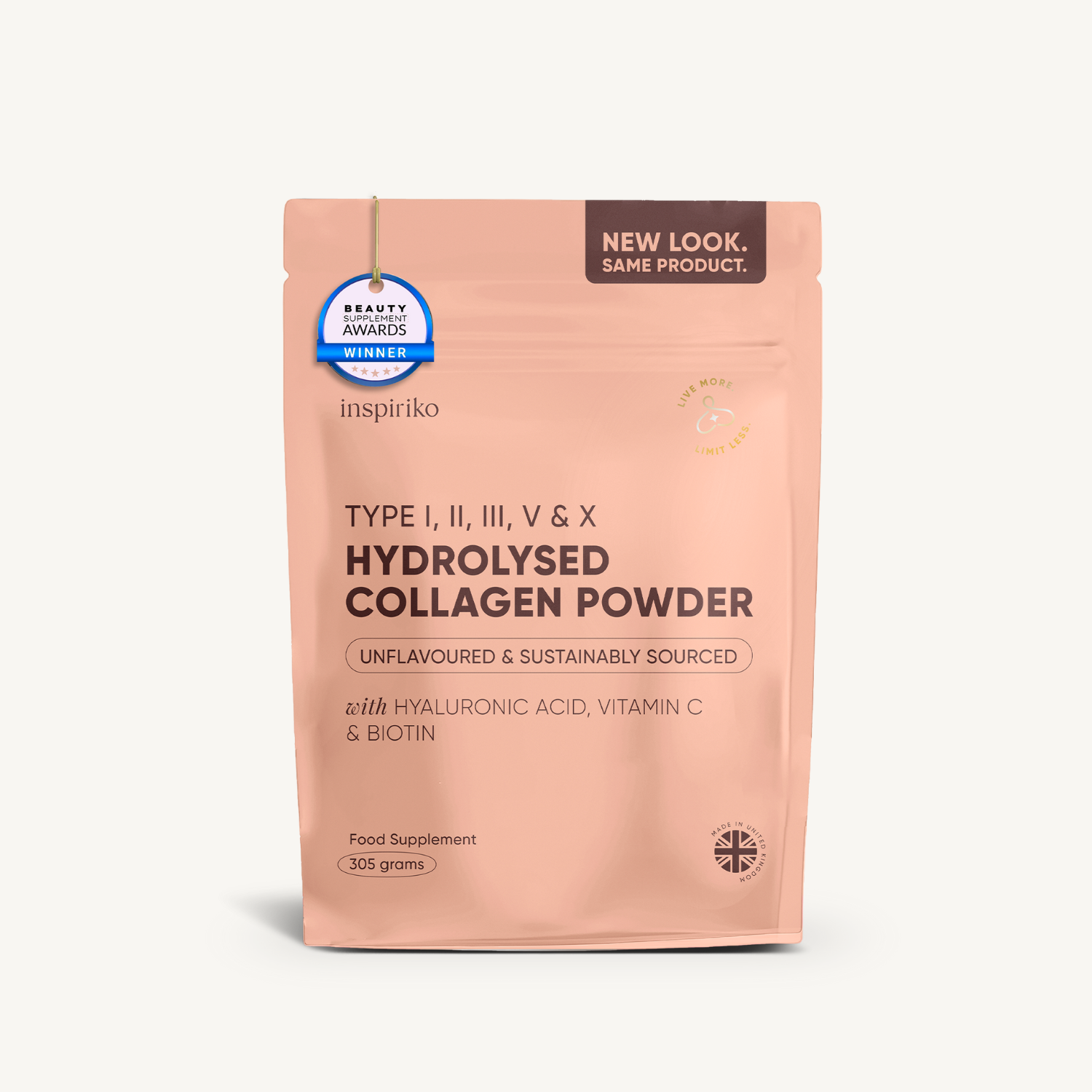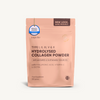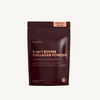Collagen, a vital protein that makes up much of our skin, hair, nails, joints, and connective tissues, has become a go-to supplement, especially for women over 35. Many use it to boost skin elasticity, ease joint pain, or support overall wellness.
But if you’re dealing with hormonal imbalances like PCOS, thyroid problems, or perimenopause, you might wonder: Is collagen good for hormonal imbalance? Could it affect my hormones? Let’s break it down in simple terms: what collagen does, how it interacts with hormones, and how to choose the best option for your unique body.

What Is Collagen and Why Do Women Take It?
Collagen is the most abundant protein in your body. It provides structure and strength to your skin, bones, tendons, joints, and connective tissues. Think of it like the scaffolding that keeps everything firm and in place.
There are at least 28 types of collagen (1), but the three most common are:
-
Type I – Found in skin, bones, and hair; great for reducing wrinkles and boosting bone strength.
-
Type II – Found in cartilage; supports joint health and mobility.
-
Type III – Helps with skin elasticity and supports organs and blood vessels.
Collagen supplements usually come from:
-
Bovine (cow) – Offers Types I and III, ideal for skin and bone health.
-
Marine (fish) – Rich in Type I, easily absorbed, and especially helpful for skin and beauty.
-
Chicken – Mainly provides Type II for joint support.
-
Eggshell membrane – Contains a mix of Types I, V, and X.
Women take collagen for various reasons: better skin, fewer wrinkles, stronger nails, shinier hair, joint relief, gut health, and even improved metabolism. These benefits are especially important when dealing with the visible and invisible changes that come with hormone shifts.
Struggling with hair thinning or slow growth? Don’t miss our deep dive into the benefits of collagen for hair growth; your strands will thank you!

Why Is Collagen So Popular Among Women 35+?
Collagen production naturally declines with age, starting in your mid-to-late 20s and dropping more steeply after 35. But here’s the kicker: hormonal shifts during perimenopause and menopause accelerate this loss even further, especially with falling estrogen levels. That’s when you start to notice:
-
Fine lines are becoming deeper
-
Thinning hair
-
Brittle nails
-
Joint aches and stiffness
-
Skin that no longer feels as firm or elastic as it once did
This is exactly why collagen for hormones has become so popular, because it supports both beauty and wellness during a time of hormonal transition. If you're looking for safe, natural options, adding collagen for hormone balance can be a gentle yet effective way to support your skin, bones, and overall well-being.

How Do Hormonal Imbalances Work?
Hormonal imbalances occur when the body makes too much or too little of certain hormones, disrupting the normal function of important systems. In women, this can be triggered by natural aging, especially during perimenopause and menopause. Chronic stress is another major factor that elevates cortisol and disrupts estrogen and progesterone levels. Endocrine disorders, poor sleep, and nutritional deficiencies also play a role.
According to studies, common hormone-related conditions include estrogen dominance, where estrogen levels outweigh progesterone, and low progesterone, which affects fertility and mood. Menopause leads to a drop in estrogen, while PCOS interferes with ovulation and insulin sensitivity. Hypothyroidism, which slows down metabolism, is another common issue. These imbalances can greatly affect overall health and wellness. (2)
The symptoms? They vary, but many women experience fatigue, unexplained weight gain, irritability, hot flashes, irregular periods, sleep disturbances, and even hair loss. These signs often come in waves and can feel overwhelming, especially when multiple hormones are involved at once.
Relationship Between Collagen and Hormones
Does collagen contain hormones?
No, collagen does not contain hormones. It is a structural protein, not a hormone-producing substance. However, hormones can influence collagen metabolism by altering its synthesis or breakdown in the body. (3)
Does collagen influence hormones?
Collagen doesn't directly change hormone levels, but studies show it may indirectly ease estrogen-deficiency symptoms like menopause-related weight gain by improving satiety, reducing fat accumulation, and supporting metabolic health without altering hormone balance. (4)
Potential impact on estrogen levels
Collagen doesn't directly raise estrogen levels, but its biosynthesis - stimulated by proline and IGF-1 signaling - supports estrogen-sensitive tissues, indirectly aiding hormonal balance and tissue health during estrogen decline, like menopause. (5)
Collagen’s effect on cortisol and adrenal function
Cortisol reduces collagen type I production via glucocorticoid receptor activation. AP collagen peptides block this pathway, restoring collagen synthesis and TGF-β signaling, suggesting a protective, stress-buffering role for collagen peptides. (6)

Tips for Safely Choosing and Using Collagen Supplements
-
Pick hydrolyzed collagen peptides: These are broken down into smaller units for easier digestion and better absorption. (7)
-
Choose clean, third-party-tested brands: Ensure the product is free from fillers, heavy metals, and other contaminants.
-
Check for hidden additives: Avoid supplements with artificial sweeteners, colors, or flavorings, as they may disrupt hormonal balance.
-
Be mindful of timing: The study recommends taking collagen supplements preferably in the morning, on an empty stomach. This protocol was followed by participants to enhance absorption and effectiveness. (8)
-
With or without food: It’s usually safe either way, but taking it with food may help reduce any mild digestive discomfort.
Buying collagen? Avoid these 5 common mistakes that could cost you results and your money. Read our guide before you shop! Inspiriko offers clean, high-quality collagen supplements for women. Whether you're dealing with hormonal imbalances, aging skin, or joint discomfort, our collagen products are crafted to support your beauty and wellness from the inside out.
Final Verdict: Is It Safe?
Yes, collagen supplements are generally safe for women, even with hormonal imbalances, as long as the product is high quality and used in appropriate doses. However, it's wise to consult a healthcare provider if you’re pregnant, breastfeeding, or managing conditions like thyroid disorders or estrogen-sensitive issues.
When sourced cleanly and paired with a balanced diet, exercise, stress management, and good sleep, collagen can be a supportive part of a holistic hormone-friendly lifestyle. It won’t replace hormones, but it can help with skin, joints, metabolism, and more, especially during life phases like perimenopause or menopause.
FAQs
Can collagen supplements affect estrogen levels?
Is marine or bovine collagen better for hormone balance?
Is collagen safe during perimenopause or menopause?
Can collagen worsen PCOS symptoms?
Should I take collagen if I have hypothyroidism?
How long does it take to see results from collagen?
References for the blog
-
Cleveland Clinic, 2022. Collagen:
what it is, types, function & benefits.
Available at: https://my.clevelandclinic.org/health/articles/23089-collagen -
Cleveland Clinic, 2022. High estrogen:
levels, symptoms and causes.
Available at: https://my.clevelandclinic.org/health/diseases/22363-high-estrogen -
Borel, J.P., Maquart, F.X. and Randoux, A., 1984. Contrôle hormonal du métabolisme du collagène. Pathologie Biologie (Paris), 32(7), pp.795–812.
Available at: https://pubmed.ncbi.nlm.nih.gov/6387598/ -
Choi, S.Y., Ko, E.J., Lee, Y.H., Kim, B.G., Shin, H.J., Seo, D.B. and Lee, S.J., 2016. Effects of collagen tripeptide supplement on skin properties:
a prospective, randomized, controlled study. Journal of Cosmetic and Laser Therapy, 18(8), pp.424–430.
Available at: https://pmc.ncbi.nlm.nih.gov/articles/PMC5118756/ -
Karna, E., Szoka, Ł., Huynh, T.Y.L. & Palka, J.A., 2020. Proline-dependent regulation of collagen metabolism. Cellular and Molecular Life Sciences, 77(10), pp.1911–1918.
Available at: https://pmc.ncbi.nlm.nih.gov/articles/PMC7228914/ -
Chae, M., Bae, I.-H., Lim, S., Jung, K., Roh, J. and Kim, W., 2021. AP collagen peptides prevent cortisol‑induced decrease of collagen type I in human dermal fibroblasts. International Journal of Molecular Sciences, 22(9), article 4788.
Available at: https://pmc.ncbi.nlm.nih.gov/articles/PMC8125628/ -
Virgilio, N., Schön, C., Mödinger, Y., van der Steen, B., Vleminckx, S., van Holthoon, F.L., Kleinnijenhuis, A.J., Silva, C.I.F. and Prawitt, J., 2024. Absorption of bioactive peptides following collagen hydrolysate intake: a randomized, double‑blind crossover study in healthy individuals. Frontiers in Nutrition, 11, article 1416643.
Available at: https://www.frontiersin.org/journals/nutrition/articles/10.3389/fnut.2024.1416643/full -
Reilly, D.M., Kynaston, L., Naseem, S., Proudman, E. & Laceby, D., 2024. A clinical trial shows improvement in skin collagen, hydration, elasticity, wrinkles, scalp, and hair condition following 12‑week oral intake of a supplement containing hydrolysed collagen. Dermatology Research and Practice, 2024, article 8752787.
Available at: https://pmc.ncbi.nlm.nih.gov/articles/PMC11254459/









